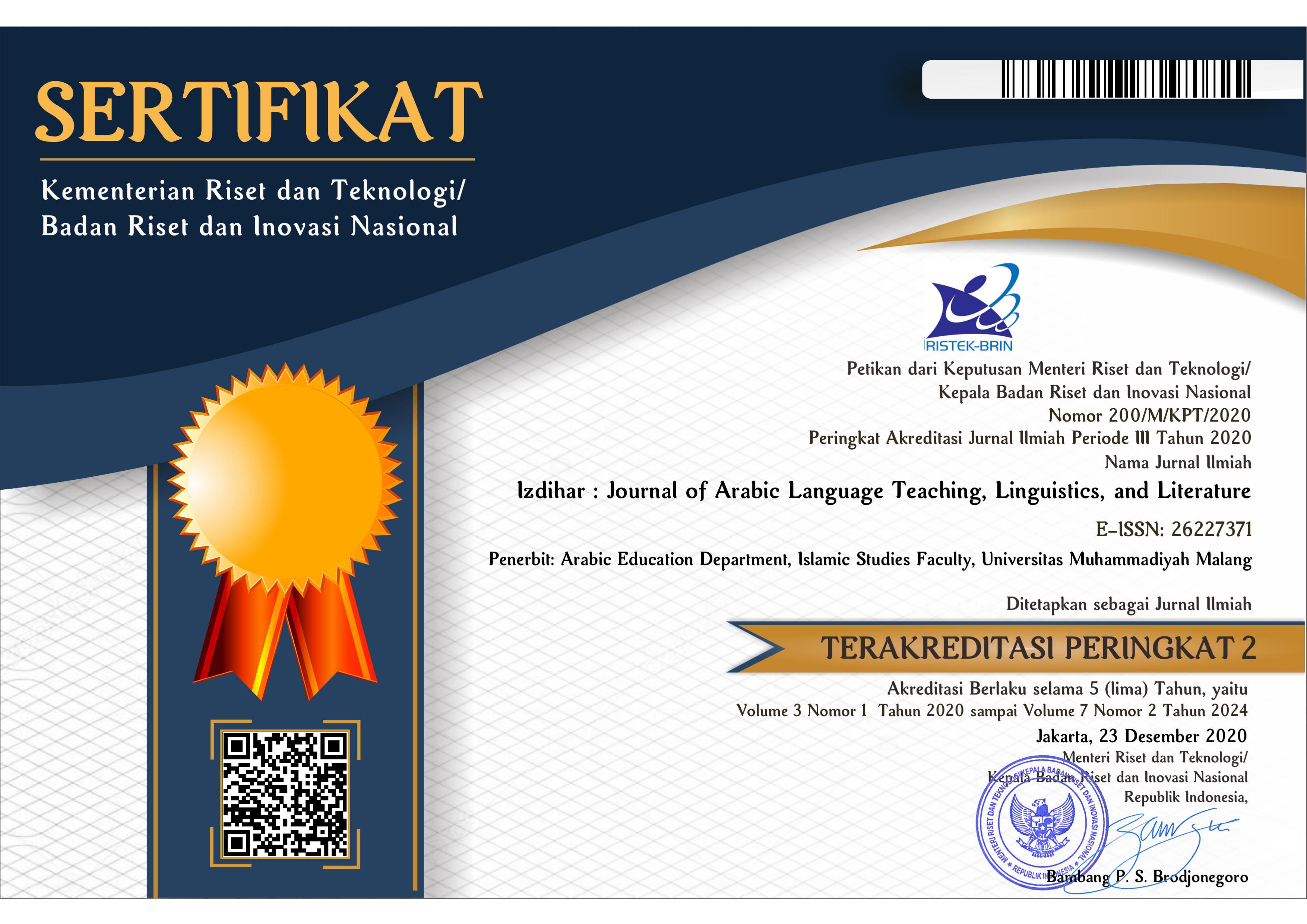Improving the Motivation of Students in Arabic Language Learning through Learning Management System
DOI:
https://doi.org/10.22219/jiz.v4i3.19110Keywords:
ARCS, Distance Learning, Kalam Ibtidaai Course, Speaking SkillsAbstract
Learning Arabic language for novice students can be something difficult if they do not have a right motivation and teachers do not have a good approach. The Attention, Relevance, Confidence, and Satisfaction (ARCS) model of motivation should be applied to real-world educational settings, including computer-based learning approaches, to find more effective ways of understanding the major influences on learning motivation and for systematic ways of identifying and solving problems with learning motivation. This study aimed to improve the motivation of students in Arabic language learning through learning management system and to improve students’ outcome of Arabic speaking skills. This classroom action research was conducted two cycles (repeated five times). Each cycle referred to Spiral Model by Kemmis, McTaggart, and Nixon. The subjects were 39 students of C Class and D Class in Kalam Ibtida’i Course at academic year 2021-2022 in the Department of Arabic, Faculty of Letters, Universitas Negeri Malang, Indonesia. The data of students’ motivation were obtained from performance grading rubric of the relevance component of the ARCS Model and the data of students’ outcome in Arabic language learning were obtained from students worksheet assesment and end-of-cycle Arabic speaking test. The results showed the improving of: (1) the motivation of students in Arabic language learning through learning management system and (2) the students’ outcome of Arabic speaking skills. This ARCS Model was effectively used for this Kalam Ibtida’I course because novice students need good motivation to learn Arabic speaking skills.
Downloads
References
Ainin, Moh. 2014. Metodologi penelitian peningkatan kualitas pembelajaran bahasa Arab: Teori dan Praktik. Bintang Sejahtera.
Al-Fauzan, A. bin I., Mukhtar, A. H., Muhammad, A. K., & Muhammad, A. R. (2003). Al-Arabiyyah baina Yadaik. In Riyadh: Al Maktab Ar Ra’isy Al ‘Arabiyyah lil Jami’Al Waqful Islamiy. Al Maktab Ar Ra’isy Al ‘Arabiyyah lil Jami’Al Waqful Islamiy.
Alfiyana, R., Sukaesih, S., & Setiati, N. (2018). Pengaruh Model ARCS (Attention, Relevance, Confidence, Satisfaction) dengan metode Talking Stick Terhadap Motivasi dan hasil belajar siswa materi sistem pencernaan makanan. Journal of Biology Education, 7(2), 226–236. https://doi.org/10.15294/jbe.v7i2.24287
Arikunto, Suharsimi. 2012. Prosedur penelitian: Suatu pendekatan praktek. Rineka Cipta.
Chang, M. M., & Lehman, J. D. 2002. Learning foreign language through an interactive multimedia program: An experimental study on the effects of the relevance component of the ARCS Model. CALICO Journal, 20(1), 81-98. https://www.jstor.org/stable/24149610?seq=1
Daif-Allah, A. S., & Aljumah, F. H. (2020). Differences in Motivation to Learning English among Saudi University Students. English Language Teaching, 13(2), 63-74. ERIC Number: EJ1240324
Engelschalk, T., Steuer, G., & Dresel, M. (2017). Quantity and quality of motivational regulation among university students. Educational Psychology, 37(9), 1154-1170. https://doi.org/10.1080/01443410.2017.1322177
Fauzi, M. F., Fatoni, A., & Anindiati, I. (2020). Pelatihan peningkatan kualitas evaluasi pembelajaran bahasa Arab berbasis information dan communication technology (ICT) untuk pengajar bahasa Arab. Jurnal Terapan Abdimas, 5(2), 173-181. http://doi.org/10.25273/jta.v5i2.5620
Fauzi, M. F., Murdiono, M., Anindiati, I., Nada, A. L. I., Khakim, R. R., & Mauludiyah, L., & Thoifah, I. (2020). Developing Arabic language instructional content in Canvas LMS for the era and post Covid-19 pandemic. Izdihar: Journal of Arabic Language Teaching, Linguistics, and Literature, 3(3), 161-180. https://doi.org/10.22219/jiz.v3i3.15017
Haron, S. C., Ahmed, I. H., Mamat, A., Ahmad, W. R. W., & Rawash, F. M. M. (2016). Challenges in learning to speak Arabic. Journal of Education and Practice, 7(24), 80-85. ERIC Number: EJ1112863
Hess, A. N. (2015). Motivational design in information literacy instruction. Communications in Information Literacy, 9(1), 44–59. https://doi.org/10.15760/comminfolit.2015.9.1.175
Huang, D. W., Diefes-Dux, H., Imbrie, P. K., Daku, B., & Kallimani, J. G. (2004). Learning motivation evaluation for a computer-based instructional tutorial using ARCS model of motivational design. Proceedings - Frontiers in Education Conference, FIE. 34th Annual Frontiers in Education, T1E-30. https://doi.org/10.1109/fie.2004.1408466
Keblawi, F. (2020). Motivational Strategies in the English Classroom: The Case of Arab Learners in Israel. International Journal of Educational Methodology, 6(3), 579-586. ERIC Number: EJ1268312
Keller, J. M. (2016). Motivation, Learning, and Technology: Applying the ARCS-V Motivation Model. Participatory Educational Research, 3(2), 1–13. https://doi.org/10.17275/per.16.06.3.2
Kemmis, S., McTaggart, R., & Nixon, R. (2014). Introducing Critical Participatory Action Research. Dalam The Action Research Planner (pp. 1–31). Springer.
Kholidiyah, N. F. (2021). Perceptions of student in portfolios of Arabic Linguistics Course for independent learning. Al-Arabi: Journal of Teaching Arabic as a Foreign Language, 5(1), 81-94. http://dx.doi.org/10.17977/um056v5i1p%25p
Khoshsima, H., & Saed, A. (2016). Task-Based Instruction and Vocabulary Learning: A Comparative Study of Jigsaw and Information Gap Tasks on Vocabulary Learning. International Journal of Applied Linguistics and English Literature, 5(5), 228–236. DOI: http://dx.doi.org/10.7575/aiac.ijalel.v.5n.5p.228
Li, K., & Keller, J. M. (2018). Use of the ARCS model in education: A literature review. Computers & Education, 122, 54-62. https://doi.org/10.1016/j.compedu.2018.03.019
Miles, Huberman, A. M., & Saldana, J. (2014). Qualitative data analysis: Methodes sourcebook (Third Edit). Sage.
Molaee, Z., & Dortaj, F. (2015). Improving L2 learning: An ARCS instructional-motivational approach. Procedia-Social and Behavioral Sciences, 171, 1214-1222. https://doi.org/10.1016/j.sbspro.2015.01.234
Ningsih, S. (2020). Persepsi mahasiswa terhadap pembelajaran daring pada masa Pandemi Covid-19. JINOTEP (Jurnal Inovasi Teknologi Pembelajaran), 7(2), 124-132. http://journal2.um.ac.id/index.php/jinotep/index
Nizam, et al. 2020. Booklet Pembelajaran Daring. Jakarta: Direktorat Jenderal Pendidikan Tinggi Kemdikbud RI.
Nurdianto, T., & bin Ismail, N. A. (2020). Pembelajaran Bahasa Arab Berbasis Common European Framework of Reference For Language (CEFR) Di Indonesia. al Mahāra: Jurnal Pendidikan Bahasa Arab, 6(1), 1-22. https://doi.org/10.14421/almahara.2020.061.01
Oktavian, R., & Aldya, R. F. (2020). Efektivitas pembelajaran daring terintegrasi di era pendidikan 4.0. Didaktis: Jurnal Pendidikan dan Ilmu Pengetahuan, 20(2): 129-135, (http://103.114.35.30/index.php/didaktis/article/view/4763/2824)
Orji, R., Reilly, D., Oyibo, K., & Orji, F. A. (2019). Deconstructing persuasiveness of strategies in behaviour change systems using the ARCS model of motivation. Behaviour & Information Technology, 38(4), 319-335. https://doi.org/10.1080/0144929X.2018.1520302
Rahman, H. A., Rajab, A., Wahab, S. R. A., Nor, F. M., Zakaria, W. Z. W., & Badli, M. A. (2017). Factors affecting motivation in language learning. International Journal of Information and Education Technology, 7(7), 543-547. http://www.ijiet.org/vol7/927-ME1004.pdf
Riyadi, DE. 2020. Metode Common European Framework of of Reference for languages (CEFR) dalam pembelajaran bahasa Arab. Al-Fakkaar: Jurnal Ilmiah Pendidikan Bahasa Arab, (Online), 1(1), 42-59. http://e-jurnal.unisda.ac.id/index.php/ALF/article/view/2047
Sa'diyah, H., & Abdurahman, M. (2021). Pembelajaran bahasa Arab di Indonesia: Penelitian terhadap motivasi belajar bahasa asing. Lisanan Arabiya: Jurnal Pendidikan Bahasa Arab, 5(1), 51-69. https://doi.org/10.32699/liar.v5i1.1665
Santoso, I. (2014). Pembelajaran bahasa asing di Indonesia: Antara globalisasi dan hegemoni. Jurnal Pendidikan Bahasa dan Sastra, 14(1), 1-11. https://doi.org/10.17509/bs_jpbsp.v14i1.696
Sedighfar, Z., & KHaleghizade, S. (2016). Motivational orientation and academic achievement in non-Iranian Arabic-speaking learners of Persian. Journal of Teaching Persian to Speakers of Other Languages, 5(TOME 12), 75-94. https://jtpsol.journals.ikiu.ac.ir/article_945_0.html?lang=en
Setyosari, P. 2015. Metode penelitian pendidikan dan pengembangan. Prenadamedia Group.
Sun, S. Y. (2014). Learner perspectives on fully online language learning. Distance education, 35(1), 18-42. https://doi.org/10.1080/01587919.2014.891428
Thaer, A., & Thaer, G. (2016). The effect of ARCS motivational model on achievement motivation and academic achievement of the tenth grade students. The New Educational Review, 43(1), 68-77. https://doi.org10.15804/tner.2016.43.1.05
Ucar, H., & Kumtepe, A. T. (2020). Effects of the ARCS-V-based motivational strategies on online learners’ academic performance, motivation, volition, and course interest. Journal of Computer Assisted Learning, 36(3), 335–349. https://doi.org/10.1111/jcal.12404
Widodo, A., & Nursaptini. (2020). Problematika Pembelajaran Daring dalam Perspektif Mahasiswa. ELSE (Elementary School Education Journal), 4(2). 100-115. http://journal.um-surabaya.ac.id/index.php/pgsd/article/view/5340/3284
Zohoorian, Z., Sadr, N. M., & Shamabadi, F. (2018). A summative evaluation of “prospect 1”: Employing the ARCS model. International Journal of Instruction, 11(3), 449–462. https://doi.org/10.12973/iji.2018.11331a
Downloads
Published
How to Cite
Issue
Section
License
Copyright (c) 2021 Moh. Fery Fauzi, Irma Anindiati, Izdihar : Journal of Arabic Language Teaching, Linguistics, and Literature

This work is licensed under a Creative Commons Attribution-ShareAlike 4.0 International License.
Copyright Notice
Authors who publish with this journal agree to the following terms:
- Authors retain copyright and grant the journal right of first publication with the work simultaneously licensed under a Creative Commons Attribution-ShareAlike 4.0 International License that allows others to share the work with an acknowledgment of the work's authorship and initial publication in this journal.
- Authors are able to enter into separate, additional contractual arrangements for the non-exclusive distribution of the journal's published version of the work (e.g., post it to an institutional repository or publish it in a book), with an acknowledgment of its initial publication in this journal.
- Authors are permitted and encouraged to post their work online (e.g., in institutional repositories or on their website) prior to and during the submission process, as it can lead to productive exchanges, as well as earlier and greater citation of published work (See The Effect of Open Access).
Copyright (c) 2019 Izdihar : Journal of Arabic Language Teaching, Linguistics, and Literature

This work is licensed under a Creative Commons Attribution-ShareAlike 4.0 International License.


















